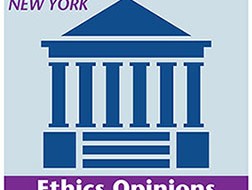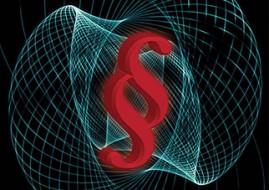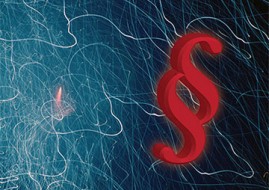Ethics & Professional Responsibility Issues in Large Law Firms
By Sarah Diane McShea [Originally published in NYPRR July 1998]
Until recently, there was a general consensus in the legal profession that ethical lapses were primarily a problem for solo practitioners and small firm lawyers and that lawyers in large and medium-sized law firms rarely committed professional misconduct and, even more rarely, faced serious professional discipline. That is no longer true. Decreasing job security at law firms, increasing economic pressures on lawyers and law firms, and lawyers’ expectations that they should reap the profits of their efforts, have resulted in an explosion of particular kinds of professional misconduct rarely seen in past decades.
Billing fraud by lawyers at medium-sized and large law firms seems to account for much of the increase in disciplinary cases involving lawyers at prominent and reputable firms. This presents a new array of problems for law firms, which now may face three different types of firm-wide exposure and liability: criminal, civil and disciplinary.
Many readers are familiar with the Harvey Myerson case. Myerson, a former partner in the prominent New York City firms of Webster & Sheffield, and Finley, Kumble, Wagner, Heine, Underberg, Mardey, Myerson & Casey, was convicted in federal court of overbilling his client Shearson Lehman Hutton about $2 million. In a nine-month period, Myerson submitted false bills to Shearson Lehman which substantially inflated the monthly legal fees due to Myerson & Kuhn.
Four other lawyers at Myerson & Kuhn were prosecuted for their active or passive involvement in Myerson’s overbilling scheme. Two lawyers cooperated extensively with the government, avoided criminal prosecution and were publicly censured by the Appellate Division. [Matter of Claremont, 219 A.D.2d 195, 640 N.Y.S.2d 84 (1st Dept. 1996); Matter of Segall, 218 A.D.2d 331, 638 N.Y.S.2d 444 (1st Dept. 1996).] Two more senior lawyers also cooperated with the government, but were required to plead guilty to federal offenses (submitting false billing statements to Shearson) and were suspended from practice for one year. [Matter of Ruegger, 207 A.D.2d 166, 621 N.Y.S.2d 308 (1st Dept. 1995); Matter of Cooper, 200 A.D.2d 221, 613 N.Y.S.2d 396 (1st Dept. 1994).] Myerson, who mentored all four lawyers and reportedly reassured them about the propriety of the fraudulent billing scheme, was sentenced to prison and suspended on an interim basis. A final disciplinary sanction has not yet been imposed on Myerson. [Matter of Myerson, 182 A.D.2d 242, 588 N.Y.S.2d 142 (1st Dept. 1992).]
Last year, William Duker pled guilty to defrauding the Resolution Trust Corporation and the Federal Deposit Insurance Corporation of $1.4 million, by submitting false bills for legal services. Duker’s bills inflated the number of hours worked by various lawyers and support staff on RTC and FDIC matters. Duker was automatically disbarred. [Matter of Duker, A.D.2d__. 662 N.YS.2d 847 (3d Dept. 1997).]
Padding Expenses & Altering Receipts
Another common form of billing fraud is padding expenses, altering receipts and billing personal expenses to clients. Many firms issue credit cards to partners and associates, and require them to submit expense reports or vouchers to obtain reimbursement for client-related expenses, such as meals or travel. Law firms want to assure that legitimate expenses are reimbursed and that clients are billed for all expenses incurred on their behalf. However, problems arise when unscrupulous lawyers doctor their receipts or credit card statements or falsely attribute personal expenses to clients. This often goes undetected, partly because the amounts involved are reasonably modest (although cumulatively they may be significant) and partly because law firms simply cannot audit all expense reports or client bills.
The consequences of getting caught, however, are serious. Lawyers who steal from their law firms or their clients face disbarment. Arthur Kroll, at one time a senior partner in Patterson Belknap Webb & Tyler, submitted altered expense vouchers and doctored receipts to obtain reimbursement for personal expenses. Over a three-year period, Kroll received more than $45,000 as reimbursement for personal expenses, which had been improperly billed to clients. Kroll claimed that his clients benefitted because he consistently under billed for his time and cut bills on a monthly basis. He also attempted to justify the doctored receipts by claiming that he increased some amounts to cover other out-of-pocket expenses like taxi fares for which he had no receipts. The Appellate Division disbarred Kroll, rejecting his claim that his law firm had approved his “unorthodox” reimbursement practices. [Matter of Kroll, 212 A.D.2d 220, 630 N.Y.S.2d 5112 (1st Dept. 1995).]
Charles Shapiro, a partner at Shulte Roth & Zabel, a reputable New York City law firm, admitted that, over a three-year period, he created receipts for some expenses, altered receipts for others and sent bills to clients that contained false descriptions of the disbursements. A private investigative firm conducted an internal investigation for the law firm, which then conducted its own review and, ultimately, reported the matter to the Disciplinary Committee. The partner admitted his misconduct, agreed to make restitution, resigned from the firm and, in the end, resigned from the bar, which in New York, is essentially a disbarment on consent. [Matter of Shapiro, 223 A.D.2d 146,644 N.Y.S.2d 894 (1st Dept. 1996).]
Billing Clients Directly
Billing fraud comes in many shapes and sizes. Some lawyers have simply billed clients directly – sometimes on personal letterhead — and deposited the fees collected in their personal accounts rather than the law firm’s account. Over a seven-year period, one partner in a medium-sized law firm routinely billed some of the firm’s clients on his own letterhead, collecting an average of $100,000 per year that he did not report to the firm or his partners. In attempting to explain his conduct, the attorney testified that he believed that the firm was substantially underpaying him. The Appellate Division disbarred him, holding that lawyers who convert or misappropriate funds are “presumptively unfit to practice law.” [Matter of Chernoff, 197 A.D.2d 110, 112, 611 N.Y.S.1I 6, 7 (1st Dept. 1994).] The Court did not distinguish between lawyers who convert clients’ funds and those who convert funds belonging to their law firms. Two years later, Sherman Taub, a partner in a major New York City firm, resigned from the bar, following charges that he collected legal fees directly from clients without the law firm’s knowledge or consent and charged personal expenses to clients and the firm. [Matter of Taub, 223 A.D.2d 327, 645 N.YS.2d 479 (1st Dept. 1996).]
Personal Problems Don’t Excuse the Offense
Lawyers’ motivations for billing personal expenses to their firms and clients vary considerably and sometimes involve compelling personal circumstances. Disciplinary courts, however, seem to have little sympathy for such lawyers and treat the conduct as intentional and inexcusable. The Court disbarred an attorney who billed more than $50,000 in Concorde flights and luxury purchases to clients. In somewhat morbid fashion, the Court’s opinion detailed the attorney’s purchases: “an antique magnifying glass, a pair of gold cuff links, art antique silver wine funnel, gold pens, an antique cushion, a rock crystal sphere, a golf bag and club covers and a porcelain object.” The lawyer, who advised the firm that the charges were for routine client expenses such as filing fees, was reimbursed by the firm and the clients were billed accordingly. The Court dismissed the attorney’s explanation that he was suffering from emotional and psychological problems and an intense “confluence of pressures” and disbarred him, finding the conduct deliberate and not causally-connected to the mitigating factors. [Matter of Geiger, 170 A.D.2d 134, 572 N.Y.S.2d 11 (1st Dept. 1991).]
Young attorneys rarely fare better. The Appellate Division suspended Charlotte Eaton, whose firm reported to the Disciplinary Committee that she had used a firm credit card for unauthorized personal expenses. After the firm reprimanded Eaton, she continued to bill personal expenses on the firm credit card. She gave the firm a check for nearly $7,500 to repay the unauthorized expenses, but the check bounced and she never made good on it. The Disciplinary Committee moved to suspend Eaton for failing to cooperate with its investigation — Eaton claimed she had moved to the Czech Republic, but then agreed to accept service of the complaint at an address on Madison Avenue. The Appellate Division suspended Eaton for failing to cooperate with the Committee and then disbarred her for failing to appear within six months, as required by the Court’s rules. [Matter of Eaton, 218 A.D.2d 134, 636 N.Y.S.2d 772 (1st Dept. 1996) (interim suspension), 225 A.D.2d 32, 647N.Y.S.2d 521 (1996) (disbarment).]
How do law firms prevent and detect billing fraud? Law firms are well-advised to have written policies for expense reimbursement, to require documentation for all expenses and to employ experienced bookkeeping and accounting personnel to review and, when appropriate, audit receipts and vouchers submitted for reimbursement. All bills submitted to clients should be reviewed carefully — and not simply by the partner responsible for the particular client involved. Even the most careful law firm will not be able to detect every instance of inflated hours or phantom expenses, but every firm must make serious efforts to do so or face the real possibility of criminal prosecution, disciplinary action and civil liability.
DISCLAIMER: This article provides general coverage of its subject area and is presented to the reader for informational purposes only with the understanding that the laws governing legal ethics and professional responsibility are always changing. The information in this article is not a substitute for legal advice and may not be suitable in a particular situation. Consult your attorney for legal advice. New York Legal Ethics Reporter provides this article with the understanding that neither New York Legal Ethics Reporter LLC, nor Frankfurt Kurnit Klein & Selz, nor Hofstra University, nor their representatives, nor any of the authors are engaged herein in rendering legal advice. New York Legal Ethics Reporter LLC, Frankfurt Kurnit Klein & Selz, Hofstra University, their representatives, and the authors shall not be liable for any damages resulting from any error, inaccuracy, or omission.
Related Posts
« Does Your Client Own Your ‘Entire File’? Researching Ethics Issues in N.Y.: Adventures in the Archipelago »








